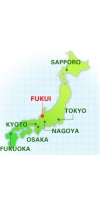Wine from Fukui

Fukui is a beautiful region located at the center of Japan’s sea coast. The region has Fukui has varying weather conditions. Winter brings a lot of precipitation accompanied by cold winds that bring abundant water while summer season provides warm and sunny weather where locals and tourists get to enjoy the beaches, islands and beautiful landscapes. Fukui’s abundance in water allows for wide variety of rice to get cultivated and harvested in the region. Water and rice are commonly made as delicious sakes, which are alcohol beverages that people in Fukui enjoy.
Among Fukui’s many popular sakes are the Denshin Ine Junmai, Kokuryu Ryu Daiginjo, Born Tokusen Junmai Daiginjo and Ippongi Ginkobai Umeshu. Fukui is blessed with clean water and crops. The region’s clean landscape and farmlands has made them notable for some of the most delicious rice and sake.
No products found
- back
Selected Options
Regions
Categories
Pricing
Countries
Regions
Grape Types
Wineries
Organic/Free Shipping
Dominique Piron Morgon Cote du Py is made from 100 percent Gamay.
The Morgon Cru is based in the heart of Northern Beaujolais. Côte du Py is the heart of Morgon, a little hill of very old blue stone rocks - the oldest soils of Beaujolais (around 430 millions years old), with a typical blue color.
Côte du Py has been known for centuries for being the best terroir of the village, producing long lived wines with strong structure and flavors.
Wines of the Côte du Py are very dark, profound and dense. Classic aromas of red berries, cherry, kirsh. Fruity, structured and mineral in the mouth with graphite flavors and spicy notes of black and white pepper. Wine can age up to 10 years.
Hand picked grapes are sorted manually and destemmed for 50 to 70%. Fermentation starts in concrete tanks and lasts for 18-25 days with remontages and pigeages. Then after pressurage starts the aging, for 2/3 in concrete tanks, and 1/3 in recent French oak barrels with batonages on fine lies only. After 10 month we do the blending, keeping only the best cuvees and best barrels, and do the bottling.
Pairs well with red meat like beef, duck and game (Hare, Dear, Wild Pork,…), cheses.
Manoir du Carra Beaujolais Cru Fleurie Vers le Mont is made from 100 percent Gamay.
Intense red color, subtle fruity and floral aromas of violet, berry and cinnamon. It also has a distinctive aroma of Peony and Lily flowers, typical of the "Sur le Mont" terroir. Ample in the mouth with plenty of ripe red and black fruit flavors. The structure is full and the tannins are round and elegant. Even better after a few years of cellaring.
Of the top ten Cru sites of Beaujolais, Fleurie is one of the top three. The wines show finesse, fullness, and flavor. Fleurie does age well for 3-5 years from vintage. The area was named for a Romain General named Floricum, not for the word flower in French. The size of this AOC is 875 hectares of grapes (2,161 acres) and about 180 examples of this Cru are available on the market. This Cru is known as the “Queen of Beaujolais” and the earth is slightly unusual for having blue color, due to magnesium in the soil.
Intense red color, subtle fruity and floral aromas of violet, berry and cinnamon. It also has a distinctive aroma of Peony and Lily flowers, typical of the "Sur le Mont" terroir.
It is ample in the mouth and has a lot of ripe red and black fruit flavors. The structure is full and the tannins are round and elegant.
Even better after a few years of cellaring.
Excellent with red and game meats, and cheeses.




